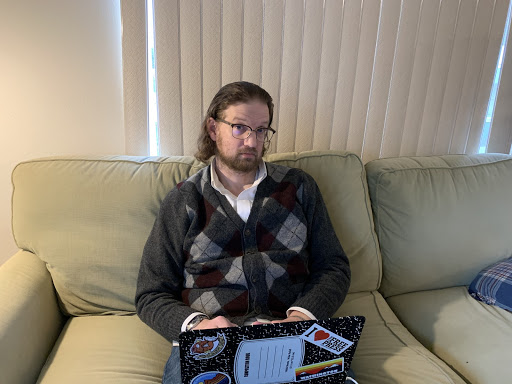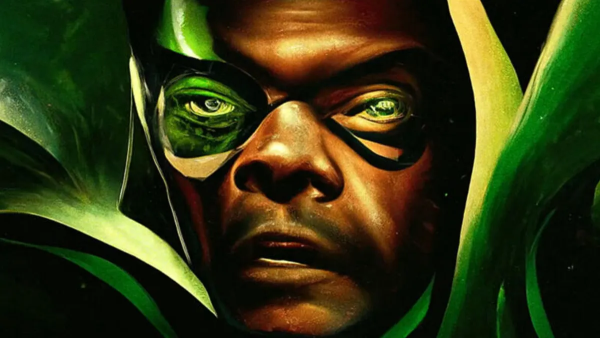Crouch’s Couch 12/20

Mr. Crouch hard at work on his couch at Stately Crouch Manor. Photo by Ms. Claire Crouch.
“They were careless people, Tom and Daisy – they smashed up things and creatures and then retreated back into their money or their vast carelessness, or whatever it was that kept them together, and let other people clean up the mess they had made.”
— F. Scott Fitzgerald, The Great Gatsby
Greetings and salutations, readers of the Catamount. The editors-in-chief of this fine publication, in their infinite wisdom, have decided to grant me this space to ruminate, to cajole, and occasionally to rant. I shall endeavor to do them proudly.
The year 2020 is blessedly drawing to a close, and not a moment too soon. So many of us have endured so much stress, uncertainty, and upheaval this year that we will gladly turn the page into January at the end of this month. Although we may feel like we’re done with COVID-19, and its associated public health protocols (including prolonged school closures), I have some news for you: COVID-19 ain’t done with us.
In the last month, confirmed cases, hospitalizations, and deaths caused by the COVID-19 virus in the US spiked to unprecedented levels. According to the Centers for Disease Control (CDC), the “7-day moving average” (the current day + 6 preceding days /7) of COVID-19 deaths on December 15 was 2,520 – over 2x higher than the average on November 15. For context, that’s nearly as many American lives lost to this pandemic as were lost on September 11, 2001. Just to be clear – that’s an average of over 2,500 deaths each day over the previous week, not the total number of deaths over that time. Clearly, we are not successfully stopping the spread of this deadly virus.
Now, I understand that COVID-19 fatigue has set in for many folks. We miss our loved ones, we miss in-person school and work, and we miss simple pleasures like going to the movies or eating in a restaurant that we may have taken for granted in the before times. I miss those things, as well. However, there are many folks among us who are, for reasons that are often invisible, particularly vulnerable to the effects of this pandemic, both directly and indirectly.
I know these vulnerabilities all too well.
I am an immunocompromised person.
My 72-year-old father is an immunocompromised person.
My 12-year-old daughter is an immunocompromised person.
Each of us has been hospitalized at some point this year due to complications of our (different for each of us) long-term, life-threatening health conditions. None of us were hospitalized due to COVID-19, and (knock on wood) none of us has tested positive for the virus as of this moment.
However, when I describe folks among us (and there are many) who are, for various reasons, indirectly vulnerable to the effects of this pandemic, this is what I mean: if and when our healthcare system becomes overwhelmed with COVID-19 patients, then we may not be able to receive the medical care we need to survive. This is not simply a worst-case hypothetical, unfortunately: in many parts of our country, and even in our own state, hospitals are already overwhelmed.
In my hometown of Wenatchee (where my parents and sister, along with many good friends, still reside), the local hospital has already cancelled non-emergency surgical procedures through the next month in order to care for COVID-19 patients. According to the Wenatchee World, “All non-emergency medical procedures that would require an overnight stay at Central Washington Hospital this month have been cancelled due to concerns of a potential increase in COVID-19 hospitalizations.” Local health officials Dr. Peter Rutherford and Dr. Malcolm Butler published a joint statement in the World on December 4 that reads, in part, “The reserve capacity that any emergency system maintains to keep everyone safe is spent. The hospital is full and pulling staff from the clinics to support those who are sick and dying in the hospital.”
Folks, for those of us who live with chronic life-threatening health conditions, this is the nightmare scenario. This is why we have pleaded with everyone to stay home and wear a mask since last spring. This is what I mean when I say indirectly vulnerable.
My health is unfortunately very fragile. I require daily IV infusions to survive. (I was tempted to end the previous sentence with “to stay healthy,” but no reasonable person would describe someone in my situation as healthy.) My situation is not a recent development: I’ve been enduring with this condition since the fall of 2015, longer than most of you reading this have known me.
I have never shared this information about myself in a public forum such as the Catamount, and I do so now only reluctantly. I share my health status not because I want anyone’s pity – I do not – but to underscore the seriousness of my condition, and the threat to my survival and the survival of my loved ones caused by the current spike in COVID-19 cases locally.
We all have a choice during the waning days of 2020, and (let us dearly hope) the waning days of the COVID-19 pandemic: we can, like Tom and Daisy Buchanan in Gatsby, behave carelessly, smash up people’s health, and let other people clean up the mess we will make. Or, we can choose to take care of ourselves and one another. We can continue to follow social distancing guidelines, avoid gatherings, wash our hands frequently, and wear masks in public.
Happy holidays, folks. I realize that it’s frustrating, but the greatest act of love we can take for each other this season is, paradoxically, to maintain our physical distance. Here’s to a much happier and healthier 2021, for all of us. Please follow public health guidelines, and stay at least six feet away from my lawn.







Roger Stephens • Dec 19, 2020 at 12:40 pm
Wonderful article Jacob. You were just a kid the last time I saw you. Very proud of what you’ve become.
Tammy Grubb • Dec 19, 2020 at 10:49 am
So very eloquent, Jacob. My best to you always.
John Schmauder • Dec 19, 2020 at 10:07 am
Love you brother. Stay well. I will continue to take your advice and isolate/mask up. I do think our biggest loophole will be the return of kids to school. I’ve been told over and over again that kids don’t get it as bad or transmit it. Unfortunately, my own personal experience says otherwise. I have two colleagues that did get covid from their teenage kids. While their kids rebounded quickly, the adults did not. I understand kids need school. But what will be the price? Especially for my students who live with grandparents or multi-generation house holds? I’ve been told that kids don’t transmit it at school. I ask have you ever seen amorous high school students in the hall or in the car together with an open campus for lunch? Not convinced those masks will stay on or the 6 foot radius will be respected.
I feel bad because we are in the 4th quarter of this pandemic. The end is in sight so we are letting our guards down. In the next two months, healthcare providers and front line workers will be vaccinated. Yet, with hope on the horizon, we are willing to go back to business as usual before the protections are in place.
How many of my students’ family members and my fellow colleagues will have their health dramatically impacted as a sacrifice on the alter of returning to normalcy? I’ve been told when I raise these concerns to administration that “you have to crack some eggs to make an omelet.” Bold words until you are the egg.
Rod Hubbard • Dec 18, 2020 at 5:08 pm
Good article. This is very true right now. A lot of people miss this important truth at times. Now and then I see groups of kids out and about– likely missing the point of the quarantine.
I like the quote from Gatsby used in the article too—well placed…
Have a great break.
Joe Baillargeon • Dec 18, 2020 at 3:12 pm
Well stated, my friend! A happy holiday to you, and may 2021 be the year the Buchanans see a comeuppance.